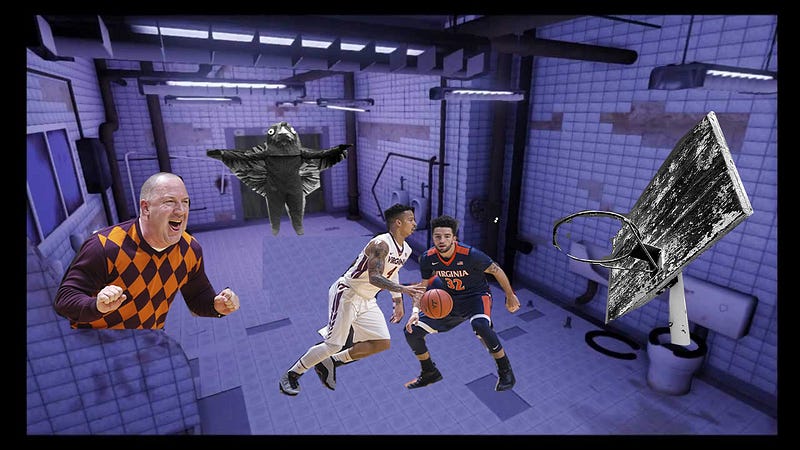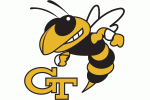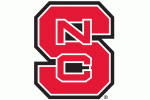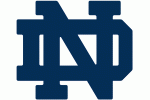I’m generally confident in Tony Bennett’s ability to take care of business, but Cassell Coliseum (pictured below) has your faithful blogger a little shook.

If you don’t know why, let’s take a peek at the the numbers from our games there since 2014.
Entering the last three meetings in Blacksburg, we’ve been ranked 4th, 6th and 3rd via Ken Pomeroy. Tech has been ranked 188th, 194th, and 105th, a disparity that correctly suggests a mismatch on paper. It hasn’t worked out that way.
Virginia’s offense has clocked in under their season efficiency mark in all three meetings and under the number allowed by Tech’s typically moribund defenses in two of the three.
Meanwhile, the Virginia defense has allowed Tech to surpass their season offensive efficiency rating in two of the last three years (surpassing our rate for the season in the same two). The games have been decided by a net five points, with Virginia needing to fashion unlikely comebacks (we trailed 43–33 with 10:41 to play in 2014 and 43–35 with 10:14 to play in 2015) over the final 10 minutes to win in 2014 and ’15 and losing last season when Tech scored 1.11 points per possession and hung 70 on us.
I watched the 2014 game with my father-in-law, a scientist who does not follow sports. He kept innocently asking how we were supposed to be so good if we couldn’t score and kept a running inquiry about what was wrong while I silently fumed alternately crossed my fingers for a win and plugged my ears with them to escape my interrogation.
So there you have it: Cassell has not been kind to us in recent years. It makes sense; after all, it’s an old (10,000-ish seats), old-school gym with bad sightlines, bad lighting, intense air, and those weird fans on the ceiling. It provides a distinct home court advantage. This is the only game on the schedule every year that I dread.
The first meeting with Tech this season went really well, almost well enough for me to discount the Cassell factor. The Hokies, failing to get anything going in transition, instead attempted to spread us out in the half court. It didn’t work: instead of working through an offense, they seemingly chucked up shots at the first crack of daylight, making just three of 20 threes and shooting 35.7% overall, trailing by 14 at the break en route to their biggest loss in the series in 25 years. The margin could and should have been bigger: we made just five of 16 threes against Tech’s zone. Devon Hall (17) and Isaiah Wilkins (15) both hit career-highs in points and added nine rebounds apiece, with London (14) chipping in a few when Tech made a small run in the second half.
The Hokies have only played once in the 10 days since that game, falling 74–68 to Miami in Coral Gables this week. Tech put five guys in double figures, but turned it over 15 times and allowed Miami to get whatever they wanted around the basket.
The story on the Hokies is the same as it was before the last one: Tech wants to get out in transition, run pick and rolls to get Justin Robinson and Seth Allen into the lane, get Zach LeDay the ball in space with room to rumble into the lane, and get three point looks for Allen, Justin Bibbs, and Ahmed Hill (a combined 150 threes and 39.9%). Chris Clarke, who is sort of a Draymond Green-ish bowling ball of a playmaking four man, is the wild card — a combination of a half court game and the defense of Devon Hall limited him to five points and just four shots in the first meeting. Tech is turnover-prone (especially at point guard) and don’t rebound the offensive glass (in order to get back on D), but they’ve still scored more from free throws and threes than they have twos for the season.
Their defense remains a mess. They’re 11th in the conference in opposing efficiency (113.1), surrendering 52.4% on twos, 39.2% on threes, and not forcing turnovers (just 15.8% of opposing possessions thanks to 14th-ranked steal and block rates) or locking down the glass (their defensive rebound percentage is just 67%). The only thing they do well is avoid fouls.
Good games from Wilkins, Hall, and Perrantes will be crucial. With Tech a tiny team (token big man Kadeem Sy played nine minutes in game one), Wilkins and Hall will be charged with much of our rebounding responsibility (a task they performed very well in the win in Charlottesville). Perrantes, meanwhile, will be the first line of defense against Seth Allen and Justin Robinson getting into the lane, something that keys the rest of their offense (secondary pick and rolls with LeDay, spot-up threes for Hill and Bibbs).
I’m looking for Virginia to dominate the glass on both ends and punish Tech in the lane on offense. As I mentioned, they’re a smaller team without a lot of shot blocking, so opportunities in the lane should be there.
Virginia Eights:
G: London Perrantes — 6'2'’ sr #32
London’s last four games: 20 assists, five turnovers. The five before that: 10 assists, 11 turnovers. I’m hoping he’s rounding into form as a primary distributor that moonlights as a shot-hunter when Devon or Jerome is running the point.
G: Devon Hall — 6'5'’ jr. #0
Devon has made more threes (23) than he made all of last season (21), and is the team leader in defensive rebound percentage (18.6%) with Jarred Reuter disappearing for the winter when conference play began.
F: Marial Shayok — 6'6'’ jr #4
Marial has been befuddled by a series of zones; he’s been held in single digits in three straight games and hasn’t attempted more than seven shots in any of them. He played at the foul line against Syracuse for a few disastrous possessions before it was determined to be a poor fit. I’d love to see him get rolling again.
F: Isaiah Wilkins — 6'7'’ jr #21
Wilkins is averaging 12.3 points and eight boards in our last three games, highlighted by 13 offensive rebounds. He’s playing great basketball.
F: Jack Salt — 6'11'’ so #33
Salt had six boards and a block against Louisville, looking as sharp as he had in a few (and avoiding the terrible up-and-under layups he broke out against Syracuse). For the month of February, he has more fouls (seven) and turnovers (six) than points, but it’s too bad that bone-crushing screens aren’t a box score stat.
G: Darius Thompson — 6'4'’ jr #51
Thompson roared back to life on O against Louisville, adding 10 points and four assists to his aggressive perimeter defense. He’s hit just one of his last nine threes, meaning it might be time for his annual swoon (he went 1–12 in January and February of last season).
G: Kyle Guy — 6'3'’ fr #5
Guy’s Syracuse outburst was heartening, but he followed it by playing his fewest minutes of the season (five) against Louisville. You never know when it’ll be your day on this team.
G: Ty Jerome — 6'5'’ fr #11
Better than I expected: Ty’s three-point shooting, which is more accurate and features better range than I anticipated. Worse than I was hoping: his care of the basketball. His turnover rate has stuck around 30%, and he has five in 31 minutes over the last two games. Some of it is just strength — he gets it straight up taken from him sometimes — some is decision making, and some is teammates just not being ready for the passes he’s attempting. I can live with numbers one (to a certain extent) and three. Number two should improve with experience.
VT Eights:
G: Justin Robinson — 6'1'’ so #5
Robinson was a non-factor (five points on four shots) in the game in Charlottesville, but rebounded for 15 against Miami thanks to seven free throw attempts. FTs are a big part of his game: he’s taking more than one for every two shots he attempts from the floor.
G: Ahmed Hill — 6'5'’ jr #13
Dating back to January 14th against Notre Dame, Hill is 3–21 from behind the arc and has scored in double figures just three times.
F: Justin Bibbs — 6'5'’ jr #10
Bibbs has a pure stroke and shot 45% from the arc on five attempts per game last season. I feel like the Hokies are leaving points on the table by not having him take eight or so every night and seeing what happens.
F: Chris Clarke — 6'6'’ so #15
Clarke is a ridiculous athlete that tries his hand at everything on the court. He’s their best defensive rebounder (21.8%), has a 21% assist rate, is very fast in a straight line with the ball, and can get up for dunks.
C: Khadim Sy — 6'10'’ fr #2
Sy has played 29 minutes in Tech’s last three games. He jumps the opening tip and starts the second half, but doesn’t impact games in between.
G: Seth Allen — 6'1'’ sr #4
Allen vs. Virginia and Miami in Tech’s last two: 1–6 on threes, six turnovers (to just four assists). He’s the kind of player that’s dangerous both to his team and their opponent, depending on the night.
F: Zach LeDay — 6'7'’ sr #32
LeDay had six rebounds against us and followed it with 10 vs. Miami. He’s scored in double digits in every game but one (vs. Texas A&M in December) this season.
F: Ty Outlaw — 6'6'’ jr #42
61 of his 78 FG attempts have been threes, and he’s hit 39%. He’s provided Tech with decent wing depth (and more defensive boards — 19.1% — than they thought they were getting).
Verdict:
I think Virginia wins, but I don’t know if it’ll be pretty. A good first 10 minutes on offense will be key — particularly coming out turnover-free, something that hasn’t always been our strong suit this season.
















